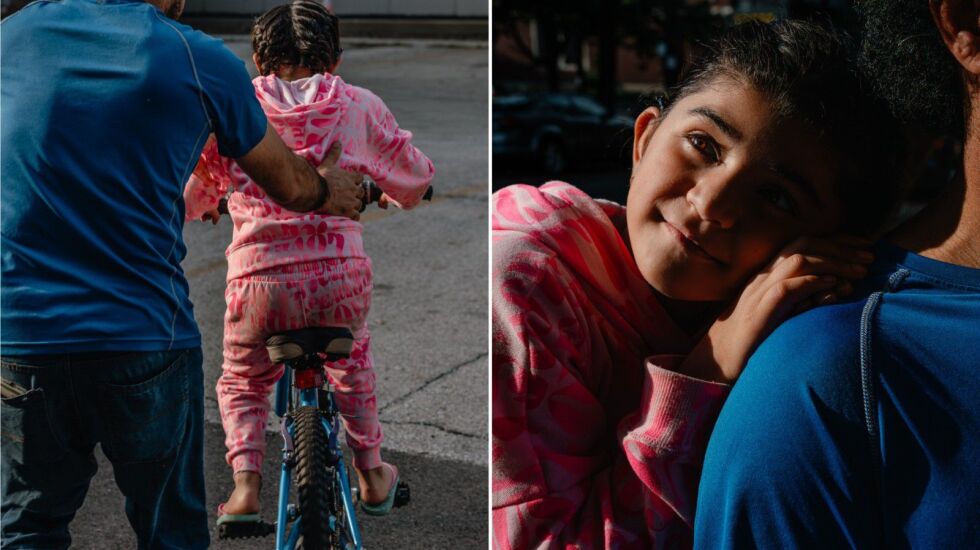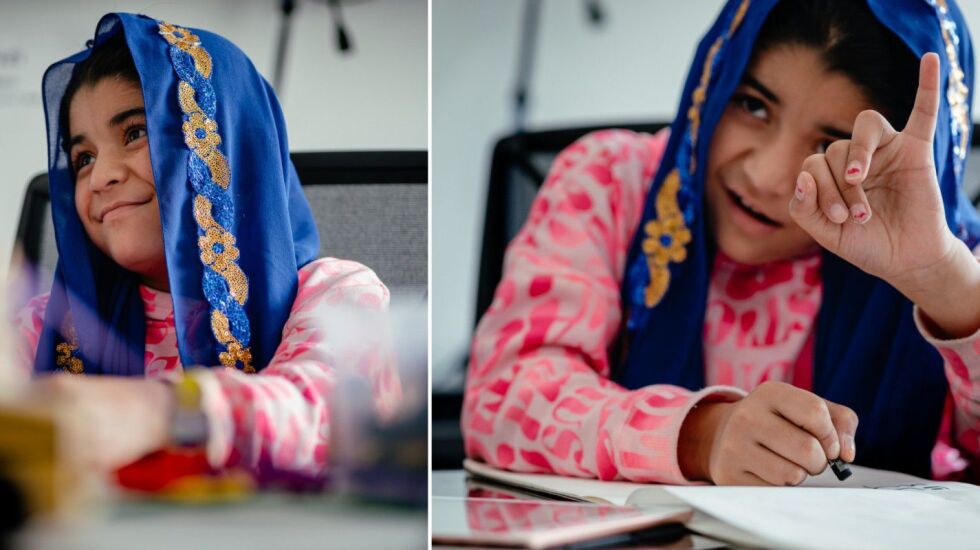
Mahbuba loves recess.
Sitting in front of an overstuffed toy bin, the 6-year-old Afghan girl picks out a small collection of wooden dolls. She gives each a name and signs their names with her hands.
Pushing back her royal blue headscarf, Mahbuba begins moving the dolls across a playground she’s sketched on a notepad. Two dolls fight over the swingset in a drama she relates through pantomime. Another kid sits on a bench.
Mahbuba, who was born deaf, is fastidious in her telling. The characters are each introduced, and their plot arcs are complete.
She moves two figurines across the page and places them on a series of drawn squares meant to represent a climbing wall at school. Oops! One falls. She illustrates this by plopping the doll face first on the page.
She then holds her hands to her eyes and shimmies her fingers down her face. The boy, she communicates with a mournful look, is crying.
As she narrates, Mahbuba dexterously weaves between drawing, imaginative play and American Sign Language, building a theatrical, pocket-sized world that is exacting and also slightly berserk. This goes on for 45 minutes, ending when a pink doll she has chosen as her own avatar gets on the bus to go home.
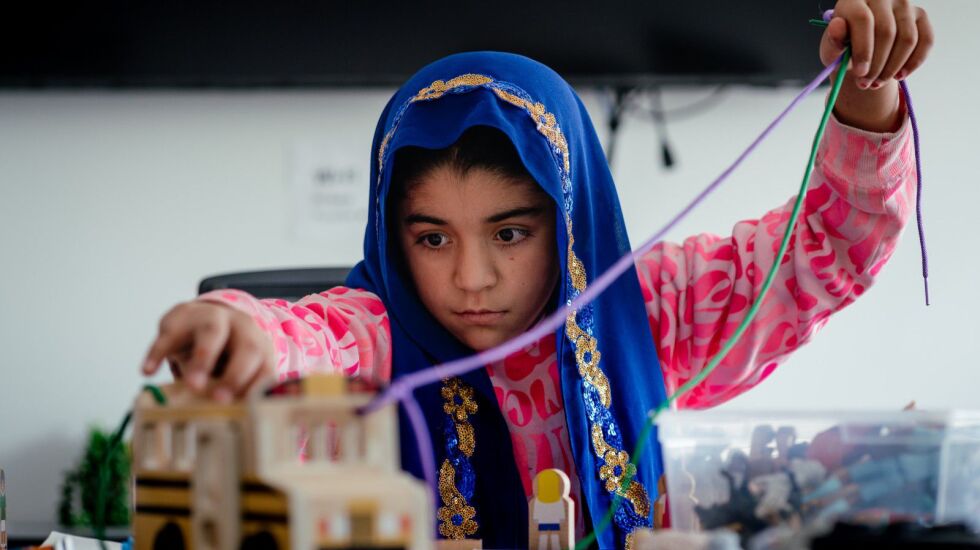
When she finishes, Mahbuba leans back in her chair, holds up her hands and spreads her fingers apart — signing, “Finished.”
Then, seconds later, she has returned to her storyboard to delve into another tale, this one unfolding in the lunchroom.
The second-grader has a seemingly limitless appetite for story. But Mahbuba’s ability to tell them is relatively new. Before landing in Chicago, Mahbuba had never told such a story. She’d never recited any kind of story at all.
‘I never lost my hope’
In November 2021, Mahbuba arrived in Chicago amid the wave of refugees who fled Afghanistan after the fall of Kabul. Like most of the tens of thousands of Afghans evacuated and relocated to the United States, Mahbuba’s family had ties to the American military. So staying in Afghanistan put their lives at risk.
After a month at a military base-turned-refugee shelter, Mahbuba and her family landed in Chicago, a city — and world — completely unknown to them. Not only did she find herself in a new country, she had arrived without any formal language.
How Mahbuba transformed over the following year captures the singular alchemy that comes with finding language, the power in knowing and naming things.
Her story also reflects the difference that just a few people — including public school teachers and aid workers — can make even with limited resources. Because of the lengths a few Chicagoans have been willing to go, this Afghan girl is finding her voice and making a new start.
Born in a small village in rural Afghanistan, Mahbuba was the only child among five in her family who was deaf. In a country where there’s little understanding of disability, and many of the 10,000 deaf children live at the fringe of society, the life Mahbuba faced seemed bleak.
“I didn’t see any future for her,” says the girl’s father, who isn’t named here to protect family members still living in Afghanistan, since they might remain in danger under Taliban rule. “I was worried about that.”
He remembers the moment he understood his daughter was deaf.
“I had a motorbike that I would take to work, and my children knew I had returned home when they heard the sound of the bike outside our house,” he says, speaking through a Pashto translator.
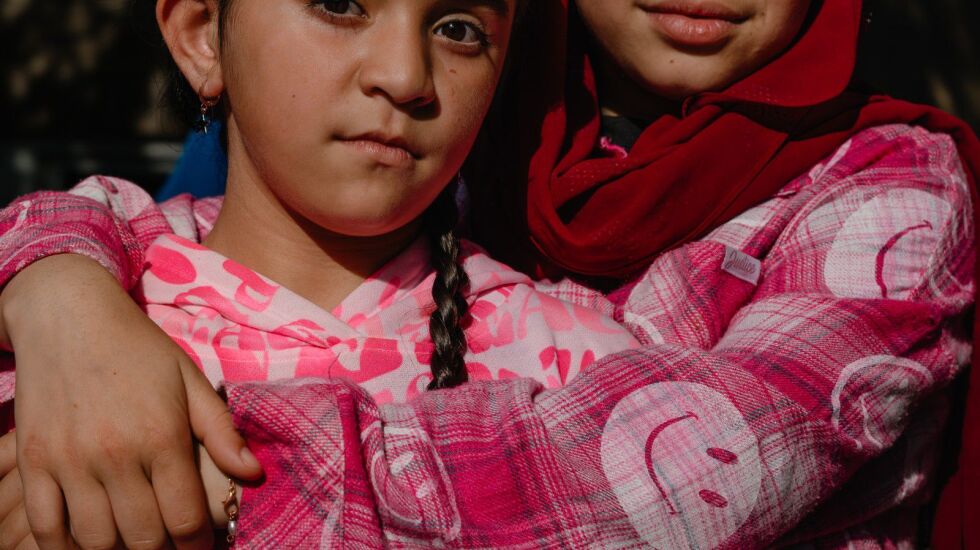
Unlike her older siblings, Mahbuba, who was about 2 at the time, didn’t react to the sound of the engine: “I thought, ‘She can’t hear it.’ ”
Eager to find another way to announce his arrival to his youngest child, Mahbuba’s father taught her to feel for the vibrations that rattled the floor when he revved the bike’s engines: “The vibrations were how I told Mahbuba that I was home.”
Over the next few years, Mahbuba’s family created a series of basic signs to communicate with her. Hunger was suggested by placing a hand on the belly and rubbing it. The sign for water was a hand holding an invisible cup to the mouth. Tea took the form of the index finger meeting the thumb, as though demurely holding a teacup handle. And an egg, a common ingredient at home, was suggested by an upward-facing, cupped hand.

But, as Mahbuba got older, the gulfs in communication grew larger.
“Mahbuba would try to explain things to us, and she’d start crying and yelling,” her father says. “It was so hard because I couldn’t understand what she wanted, what she was feeling.”
Her frustration and fear often came out at night. There were many nights the girl would wake up, her heart racing, and scream and cry, inconsolable.
“I never thought that she’d talk to us,” her father says. “But I never lost my hope.”
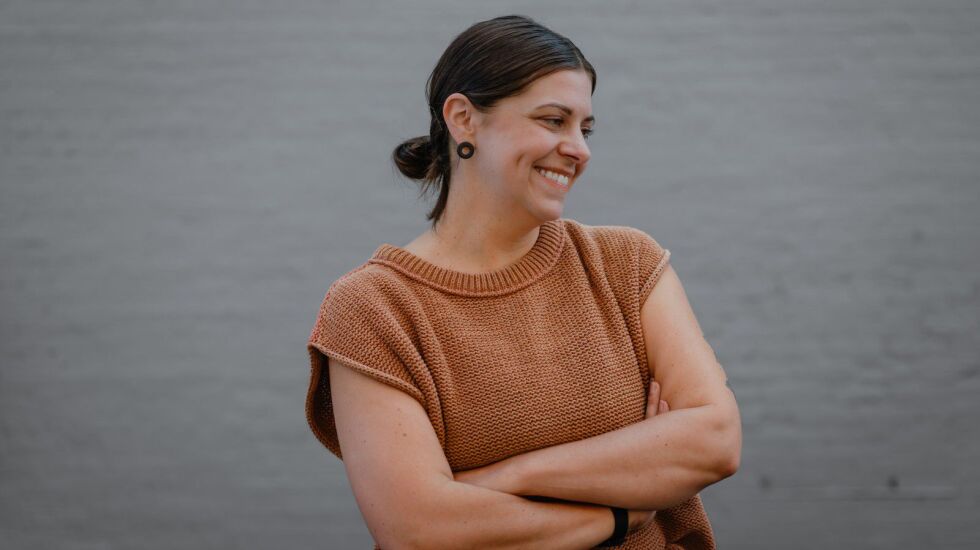
‘Never started with a kid at zero’
When Mahbuba first arrived at Bell Elementary School, one of 36 elementary-age deaf education programs in the Chicago Public Schools, everything was new to her. She had never been inside a school, let alone a classroom filled with strangers. Girls who grow up in rural Afghanistan have little access to school. As a deaf child, Mahbuba had none.
She had never sat at a school desk nor been introduced to the rhythms of a school day. The letters on the wall that spelled out the school name were unfamiliar to her.
Her first teacher was Lisa Hoffman, who specializes in deaf education and spent seven years as a deaf interpreter before coming to Bell in 2020. Hoping to make a connection with Mahbuba, Hoffman introduced herself in ASL. Developed in the early 19th century as a way for deaf Americans to communicate with each other, ASL uses the same vocabulary as spoken English but relies on gestures and facial expressions and its own grammatical logic.
But when she tried using ASL to communicate with Mahbuba, the girl’s eyes remained blank. Hoffman quickly realized she didn’t know sign language.
Even Hoffman’s students who began at low language levels had some familiarity with letters and numbers. Mahbuba had none.
“I had never started with a kid at zero,” Hoffman says.
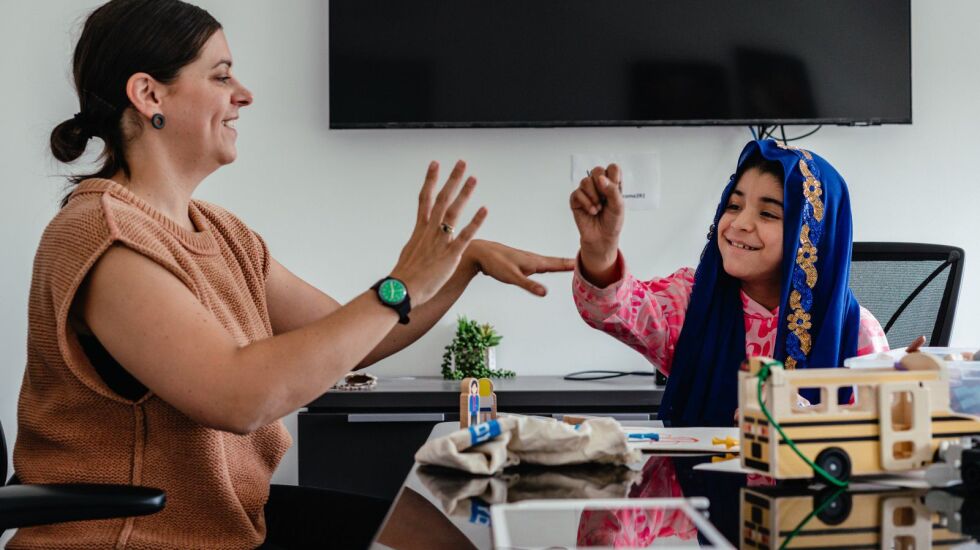
Though Bell’s deaf education program stands among the largest in the city, Hoffman knew no existing curriculum would work for Mahbuba. The teacher had to start from scratch.
“She had a 6-year-old brain,” Hoffman says, “but no internal monologue to articulate a thought. It’s so hard to understand what that would even be like.”
The impact of language deprivation — or the lack of exposure to language at an early age — reaches far beyond a limited vocabulary.
“It really affects our ability to think,” says Rachel Mayberry, a professor of linguistics at the University of California San Diego whose research focuses on language acquisition among deaf people. “When a person does not have language, it’s hard to understand beyond the here and now.”
Abstract concepts such as the passage of time, for example, or religion are difficult to describe without language.
“How do you talk about things that don’t exist?” Mayberry says. “How do you explain why we have them?”
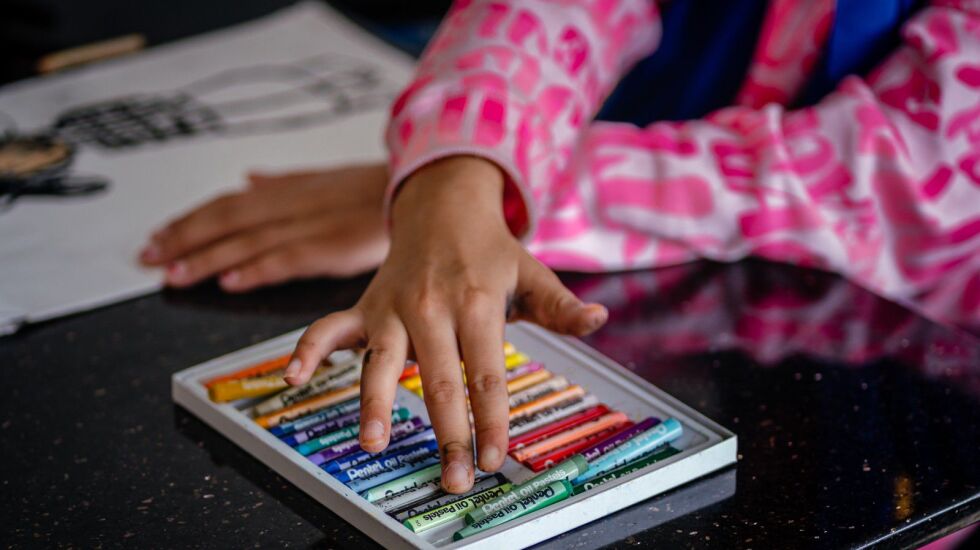
Hoffman spent the first few days sitting with Mahbuba on the floor of her classroom, playing games — mostly Jenga — and showing her toy houses where Mahbuba could play with plastic dolls and animals.
“I was really just trying to help her feel safe,” Hoffman says. “I could feel her fear.”
Over time, the teacher introduced numbers and colors. They slowly worked their way through the alphabet, written and in sign. She used cards to begin to teach Mahbuba everyday objects, food and words to describe her day at school.
Before any of that, Hoffman introduced Mahbuba to a concept both simpler and far more profound: her own name.
Hoffman started by showing Mahbuba her written name, which the teacher had drawn on various items including schoolwork binders, a supplies bin and her classroom mailbox.
“I think it was her first time seeing those letters,” Hoffman says, “and she started to mirror them almost like she was drawing, like copying each image.”
At first, Mahbuba’s lines were shaky and backwards. But Hoffman says the girl was determined to get it right: “She just wrote it over and over again.”
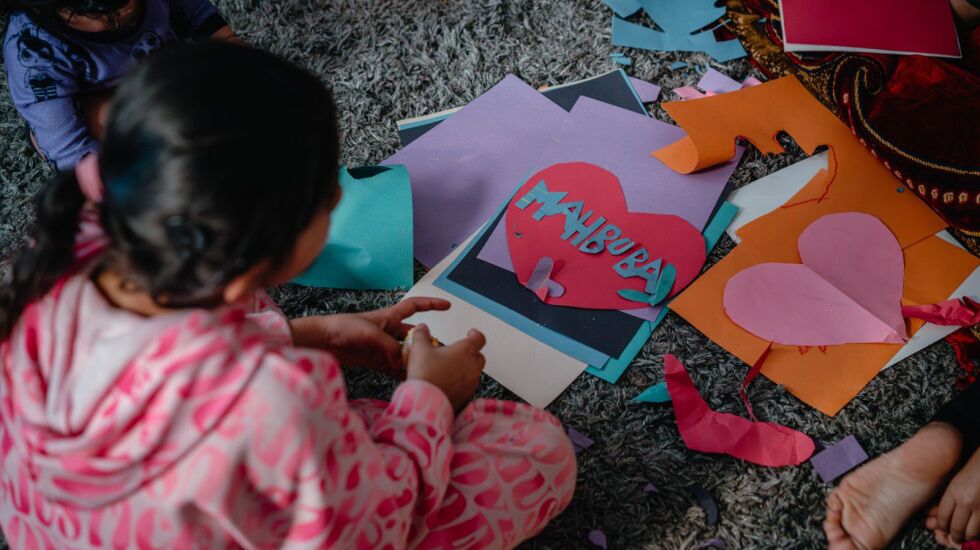
Hoffman also showed Mahbuba how to spell her name in sign. The next step was giving the girl a name sign, a unique way to identify herself in ASL. Typically, name signs reflect a personal characteristic. Hoffman’s name sign, for example, is the letter “L” pressed against the apples of her cheeks because she has dimples.
Since name signs usually are given to a person by someone in the deaf community, Hoffman asked her students to find one for Mahbuba. One boy suggested the letters “M,” which is shown by folding the fingers at the knuckles and tucking the thumb between the ring and pinky fingers, and “B,” created by four fingers pointed up and pressed together, with the thumb tucked across a flat palm.
When the class gave Mahbuba her name sign, Hoffman saw a shift in her new student.
“That was really the first moment where she realized there was this whole world of kids that have the same abilities she does,” Hoffman says. “It was like she understood that you can use your hands to speak.”
From that point on, “it’s like she’s never stopped.”
Mahbuba’s lessons in ASL accelerated. She soon came to understand that every person, place and thing carried its own unique name. Scissors, bus, apples — Mahbuba wanted to know and name any item or idea she encountered. Within a few months, Mahbuba was able to sign short, simple sentences.
Her first remains emblazoned in Hoffman’s memory. It was late in the morning, and the school buses had dropped off students for the day. As kids began trickling in, Hoffman noticed Mahbuba wasn’t among them. She found that strange. Mahbuba rarely missed school without warning.
A few hours later, Hoffman was called to the front office. Mahbuba was there, flustered. She’d been stranded at home as a result of CPS’s persistent bus problems. Looking at her teacher, Mahbuba signed: “Bus. Waiting, waiting, waiting. Nothing. Dad drive.”
Hoffman watched Mahbuba in shock. Here was a girl who had started the school year in this same office frozen with fear. And now she was signing an entire sentence with attitude and an eye roll. Hoffman was brought to tears.
“I thought, who is this child? What just happened here?” the teacher says. “It was mind-blowing.”
‘I’m so proud of her’
One afternoon at Mahbuba’s family’s apartment in Rogers Park, the living-room floor is a tapestry of sweets. A collection of small plates holds candied nuts, dates and several kinds of baklava. An Afghan flag hangs over the north-facing window, and the afternoon light casts a subtle green glow on the room.
Mahbuba begins to count the collection of treats. “One,” she signs. Then “two.”
Her efforts are cut short by her baby sister, who bulldozes through the spread. When the baby reaches out to grab a hot tea kettle that sits on the floor, Mahbuba signs, “Stop,” holding one palm flat and hitting the other against it in a chopping motion. She then lets out a yelp, a shrill burst that gets the attention of her mother, who yanks the baby away from the kettle and out of danger.
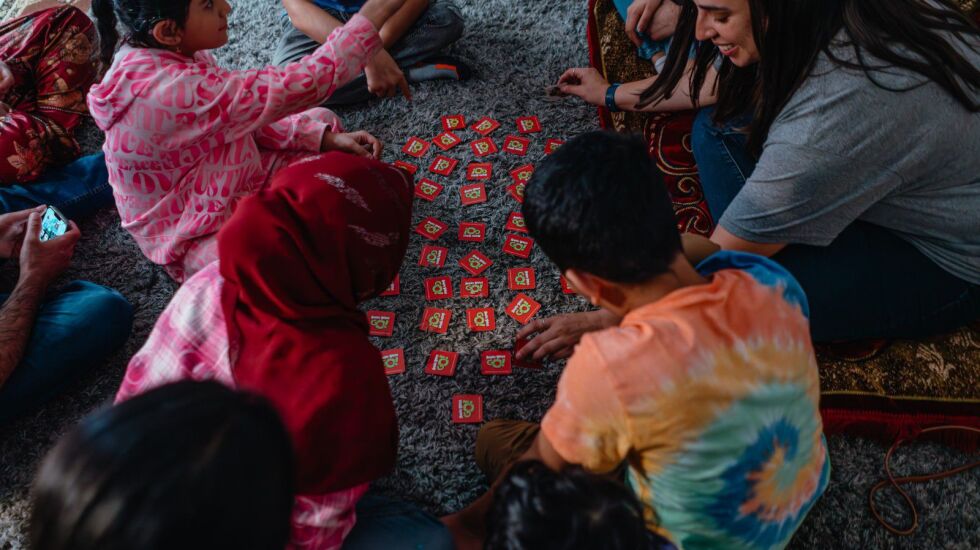
Over the next hour, Mahbuba’s siblings cycle in and out of the room. They fight over cellphone games and drawing markers. Mahbuba relies on whatever gestures, faces and sounds will best articulate her point. In one moment, Mahbuba insists her siblings sign the word for share — a gesture that involves brushing the edge of one hand along the ridge between the thumb and index finger on the other. In another, the bossy 6-year-old resorts to an elbow jab.
Mahbuba’s family takes sign language classes each week at Chicago Hearing Society, a nonprofit that offers free ASL classes. The class, like many of the services the family has received, was recommended to them by Melissa Janisch, the youth program manager for the refugee resettlement agency RefugeeOne.
Janisch is learning ASL in order to communicate with Mahbuba.
“We don’t have consistent access to an ASL interpreter,” says Janisch, who has grown close to Mahbuba and her family. “There was no other way than to just learn alongside her.”
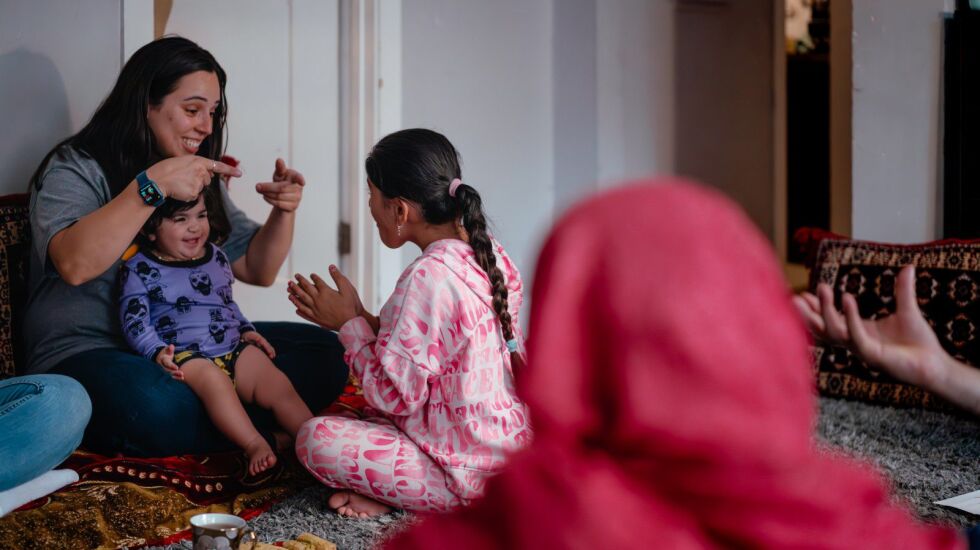
The lack of resources for deaf refugees resettled in the United States is an issue Pam Kefi wants to address. She’s associate vice president of People Inc., a nonprofit that works with deaf newcomers to the United States in New York.
“The federal government should take a closer look at developing some standards around resettlement for deaf refugees,” says Kefi, who suggests interventions including providing interpreters and providing better connections with deaf schools and the deaf community.
Later this day, Mahbuba’s father returns from the mosque where he has spent the afternoon in prayer. He settles onto the floor, his children forming a circle around him.
“In Afghanistan, Mahbuba could not understand me,” the father says. “Now, I can tell her, ‘You are my lovely daughter,’ and she can understand.”
The thought makes him smile. He and his daughter have their own private world. Despite his long hours working at Eli’s Cheesecake Factory, Mahbuba’s father remains perhaps the most enthusiastic ASL student among his family.
“I want to fly I’m so proud of her,” he says. “It’s like my feet don’t touch the ground.”
Just then, Mahbuba looks up at her father and smiles. She and her father might now share more words, but they don’t always need them.
